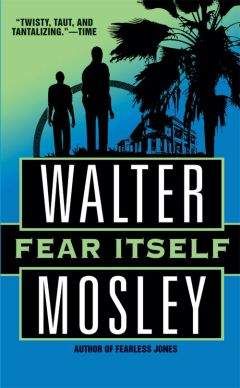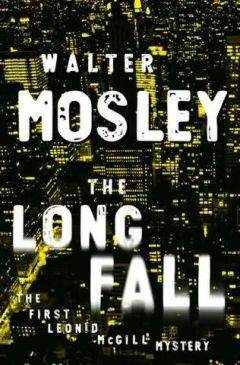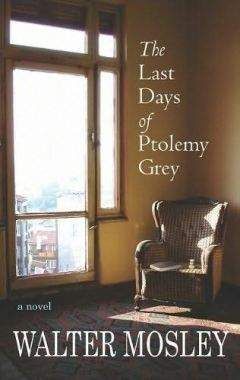Walter Mosley - Fearless Jones
After she made sure that we were eating, Fanny made a call. She wasn’t on the phone very long, and when she got off she was weepy and sad.
“That the hospital?” Fearless asked.
Fanny nodded and took a chair.
“Is he okay?”
“He came awake for a little while,” Fanny replied. “They said that he’s sleeping now and shouldn’t have company. Not even me. Not even me.”
“I’ll go down there and wait with you if you want,” Fearless said. “We could just sit outside and wait. If you’re close family, they’ll let you wait all night.”
“No,” she said. “I’ll sleep tonight and go in the morning. But thank you.”
It was kind of quiet after that. Fearless got up and served himself more soup, and I played with my fork, wishing I had a home to go to.
“Your niece didn’t want to leave you alone with us,” I said just to make some noise.
“You’re not white and not Jewish. She’s heard all kinds of stories, and she’s a suggestible girl. But she has a good heart.”
“But maybe she’s right,” I said. “You don’t know us. Don’t you think it’s strange that two black men show up at your door after another black man tries to murder your husband?”
“Stop tryin’ t’scare her, man,” Fearless told me.
“No,” Fanny said. “No, it’s all right. I’m not afraid of you, Mr. Minton. You helped Sol even though I was screaming and yelling. You did too, Mr. Jones. If I would have come on a bleeding man and somebody yelled at me, I would have run away. You went to jail. They beat you. I’m not afraid of you. It would make more sense if you were afraid of me.”
“Why we gonna be afraid of a pretty young girl like you, Fanny?” Fearless asked with a grin.
“Because all I had to do was nod my head and you would be murderers in jail.”
That pulled Fearless up short a second, but then he smiled again.
“Well, I ain’t ascared’a you, and you don’t need to be ascared’a us,” he said. “We wouldn’t hurt nobody like you. It’s like I said, I’m gonna make it my business that nobody else messes with you.”
“How you plan to do that, man?” I said, fed up with how silly they both were. She shouldn’t have been taking strangers into her home, and Fearless was nuts to want to protect somebody he didn’t even know.
Fearless gave me his sour look. For someone else that look could have meant trouble, but it was nothing to me.
“You got a wallet with no money in it,” I continued, “a borrowed car that’s low on gas even when the tank is full, you don’t have an apartment, and my place is burnt to the ground. You an’ me lucky to keep anybody from messin’ with us.”
“Oh my,” Fanny declared.
“It don’t matter about a house, Paris. I’ll find us some place to stay. And I don’t need no money to stand up to some coward wanna be messin’ wit’ old folks. If I have to, I’ll pitch a tent right here in the front yard and take a shovel for my bayonet.”
“Grass salad and earthworm steak, is that what you gonna eat?” I taunted.
“Excuse me,” Fanny Tannenbaum said in a small voice.
Fearless and I both turned our heads toward her. It was an odd thing to realize that we had begun to ignore her the same way that her nephew-in-law had ignored us earlier, the same way that white people had been ignoring us our entire lives.
“Yes, Fanny?” Fearless said.
“You gentlemen can stay here for a few days if you wish.”
I was stunned by that. I had done some traveling in my life. Fearless had been on three continents and then some, but neither one of us had ever experienced that kind of generosity. White people didn’t open their doors to questionable young black men. Hell, there weren’t many black folks I knew that would be so brave, or foolish.
“It’s the least I can do,” Fanny said. “You saved Solly’s life and… and…” — she hesitated and then drew a deep breath — “… and I am afraid to stay here alone.”
“You got your niece and nephew a couple’a blocks away,” I said. I was surprised that she offered us a place to stay, but that didn’t mean I wanted to take her up on the offer.
“That putz couldn’t save himself from walking down a hill,” she said disdainfully.
It wasn’t that funny, but Fearless laughed loud and long.
“What’s that you say, Fanny?” he crooned. “He can’t walk wit’out fallin’ down?”
The old lady started laughing too. She laughed so hard that she doubled over in the chair with her head on her knees. She forced herself to stand, still laughing, and went to a cupboard where she located a pint bottle of peach schnapps. She poured all three of us generous shots in squat glasses. The liquor was strong, and good. We finished off the first pint and put a serious dent in a second.
I was smiling with them after a while, feeling pretty good. So when Fearless said, “Sure, Fanny, we’ll stay here with you,” I didn’t see anything wrong with it. After all, we were already there, and it was after nine; we didn’t have a home to go to, and I still had some questions to ask about Elana Love.
I made a little nod and said, “Well, if we got to go, we might as well be eatin’ good and feelin’ high.”
FEARLESS GOT IT into his head to wash the dishes. Fanny offered to help, but he said that he missed simple chores after his twelve weeks in jail. He’d already explained to her that he’d gotten into an altercation with three mechanics that tried to cheat him. I thought that that would turn the sweet old lady against us, but instead she said, “My Sol was in jail. It’s a bad place where many good men go.”
SHE AND I RETIRED to the sitting room while Fearless hummed and played in the soapy water. Sol had a glass box filled with English Ovals, an imported cigarette. I smoked a few of these while we talked.
“I take it you don’t like Gella’s old man,” I said.
She made a quizzical face that suddenly became bright. “Oh,” she said, “you mean the putz.”
“Yeah.”
“He’s a coarse man,” Fanny said. “Not rude or foul-mouthed but unfinished, without manners, like a pig farmer or a policeman.”
“You don’t like the cops either?”
The schnapps made conversation easy.
“When I was a child,” she said, “the police, the army, and the pig farmers were our enemies. Morris isn’t bad, he’s just stupid about things. He’s always coming around offering to work on the house, to cut the grass. He’s telling me that he wants to help when Sol” — she sighed and looked to the ceiling — “when Sol was in prison. He’s always telling me he wants to help, but I tell him no. He thinks I’m too old to be bothered with a checkbook or the plumber, but I’m not.”
“What was that he said just before he stomped off?”
“I don’t remember,” Fanny said, but she did.
“Swatted?” I prodded. “Swear?”
“Svartza,” she whispered.
“What’s that mean?”
“It means black, but not in a nice way,” she admitted.
“Oh.”
“I would never be bothered with him, but Gella loves him — because he’s fat.”
“Huh?”
“That’s true,” she said, widening her eyes as much as she could. “She loves him because he’s so big and fat she thinks that he can protect her.”
“Protect her from what?”
“Her family was from Estonia, like us. Only they moved to Germany after the First World War. Her father, Schmoil, Solly’s brother’s son, was a rich man and smart.” Fanny pointed at her temple to show me the degree of his intelligence. I realized then that she also had had a good share of schnapps. “We left Europe after they moved. Schmoil stayed on and did business. He owned three newspapers but sold them when he saw what was coming. He put all of his money into his art collection and moved it to Switzerland. Then he moved his wife and kinder to Vienna. He thought that they would be safe there.”
“That don’t sound too safe.”
“A wife, a grandmother, three uncles, and seven children,” Fanny said, “and only him and Gella survived. They were all betrayed by a Jew, but my Solly saved Schmoil and Gella.”
“He did?” I said. I found it hard to believe that the little old man I’d seen could have saved anybody.
“When Schmoil and Gella ran, my Sol hired smugglers in Italy to put them in barrels and take them to Africa. Then he bought them passports and brought them here.” Fanny had been whispering, and I could see why. Whatever he did, it didn’t sound legal.
“Wow,” I said. “Damn. That’s a great thing. That why they put him in jail?”
“No. They said he was a thief,” Fanny said sadly. “I don’t know. He sold his tailor’s shop and went to work for those goy accountants.”
“Who?”
“Lawson and Widlow. He went to work for them.”
“If he was a tailor, why’d they need him?”
“He did his own bookkeeping for years, and he went to work for almost nothing. He stayed late every night finishing everything they gave him. He stopped laughing with me, and then one day the police came and take him away.”
“And then,” I said, seeing my opening, “after he was in jail a while, a woman named Elana Love came to your door.”
“You know her?” There was surprise and anger in the old woman’s voice.
“You see, Fanny,” I said, “Fearless an’ me aren’t really gardeners…” I related, more or less, the story of me and Elana Love.
“And this man, her boyfriend,” Fanny asked when I was through, “he’s the one that hurt Sol?”
“I don’t think it was him in the cowboy hat, but he was probably the other one. I’d bet on it.”
“But you will find out because you want the money back for your store,” she said.
“I’d like my store back,” I agreed. “At least I’d like a new place. But like I said, Leon is three kinds of bad. It might not be worth —”
“I will pay you.” It was the kind of interruption that I didn’t mind.
“What?”
“You don’t have money, Mr. Minton. You will need something.” She got everything right, right down to calling me mister. “Now that Solly’s in the hospital, I have to do something. My nephew is a fool, and Gella is just a girl. I don’t trust the police.… All I have is you and your friend. I heard those men shouting at Solly too. They said they wanted the money he stole.”
“I thought you said he didn’t steal anything?”
“He told those men that they were the thieves. He told them they were gonif and they worked for thieves.”
“You tell the cops that?” I asked.
“I was afraid to tell them anything.”
“So what can I do?”
“You said they were looking for a bond. I gave a bond to that woman. Sol had given it to me. I asked him if it was stolen, and he told me no.”
“And you believe that even after those men came in here after him?”
“Solly would never lie to me,” Fanny said with dignity. “He’s in trouble, but he wants to protect me. I want you to help me find out what kind of trouble he’s in.”
“But I could tell you that right now,” I said. “It’s that bond.”
“No,” she said. “It is more than that.”
“What?”
“I don’t know. He told me the bond was nothing but in a way that I knew there was something he wouldn’t say.”
“You don’t think Leon came here after the money Sol owed him?”
“He wanted money stolen,” Fanny said stubbornly, “not money owed.”
“How much money we talkin’ about here?” I said. “I mean, what will you pay me?”
“I have one hundred dollars. I will give that to you and then, when you tell me what she says, I’ll give a hundred more.”
“And all you wanna know is why are they coming back after Sol?”
Fanny nodded.
“There’s just one thing,” I said.
“What?”
“Fearless thinks he can live on air, but we need that money. After what he told Sol, he won’t let you pay us a dime.”
Fanny nodded again and patted the back of my hand.
“Leave me your pants and shirt,” she said.
“Say what?”
“Leave your clothes out here when you go to bed. I’ll wash them and iron them in the morning and then I’ll put the money in your pockets.”
Fearless came in only a few moments after the deal was sealed.
“All clean and dry,” he announced. “I stacked ’em in the dryin’ tray though, ’cause I didn’t want to put ’em away wrong.”
“That’s okay.” Fanny was beaming. “I can do that.”
I jumped up then. “But it better wait till tomorrow.”
“Why?” both Fearless and Fanny asked.
“If we wanna protect Fanny, then we got to find out what they came here for,” I said. “And one thing about crooks, they don’t stay in one place too long.”
8
WE DROPPED FANNY OFF at her niece’s house, which was only three blocks away on Marianna Avenue. It made sense not to leave her at home with Leon Douglas on the loose.
Fanny gave us the keys to her house.
“We’ll call you in the mornin’, Mrs. Tannenbaum, ’cause you know we’ll probably come in late at night,” Fearless told her at the front door. Fearless was a gentleman and would never just leave a woman off at the curb. I wandered up there with him.
Morris Greenspan answered the door.
“What do you want?” he asked us.
“They’re my houseguests, Morris,” Fanny said.
“You can’t come in my house,” he said, somehow taking Fanny’s explanation as a request.
“Then we’ll leave you here,” I said to Fanny.
“No,” Fanny said. “Morris, apologize to my friends.”
“You don’t even know them, Aunt Fanny. They aren’t family.”
“We better be goin’, Mrs. Tannenbaum,” Fearless said. He hated seeing any man get humiliated.
“These men are my guests,” Fanny repeated, looking up at her nephew-in-law.
The glower on the young man’s face was the same when he was eight, I was sure. Sullen and on the verge of a pout, he might have stood there for half an hour before saying hello like a good boy.
“Mr. Minton. Mr. Jones,” Gella Greenspan said as she appeared at her husband’s side. The homely girl and her bearish, sullen husband made an ungainly pair. She took the big baby’s arm. “Would you like to come in for coffee?”
It wasn’t that Gella was any less afraid of us. She was just raised better.
“We have to go,” I said. “Thanks anyway. See ya, Fanny, Morris.”
The sloppy bowling pin grimaced.




